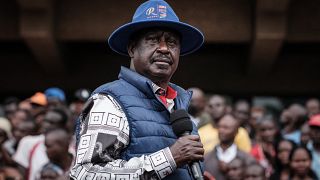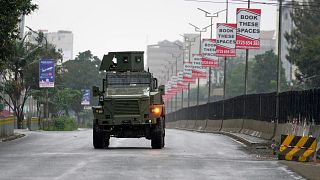Kenya
Kenya's defeated presidential candidate Raila Odinga filed a petition to the country's top court Monday, challenging the outcome of the August 9 election in what he called a fight for "democracy and good governance".
Odinga, a veteran opposition leader who ran with the backing of President Uhuru Kenyatta and the ruling party, has rejected the outcome of the poll that delivered victory to his rival William Ruto, branding it a "travesty".
The 77-year-old politician lost his fifth bid for the presidency by a narrow margin of around 230,000 votes -- less than two percentage points.
Hundreds of supporters cheered as dozens of boxes of evidence were unloaded from a truck outside the Supreme Court.
"We have enough evidence that it is us who won the election. We didn't have an election we can be proud of," Odinga told a press conference after filing the case.
The outcome of the poll represented a "continuing struggle pitting the forces for democracy and good governance against the corruption cartels that... will stop at nothing to take control of government," he said, without giving specific details.
"The action we have taken... affirms our deep belief in constitutionalism, the rule of law and a peaceful resolution of disputes."
Although polling day passed off peacefully, the announcement of the results a week ago sparked angry protests in some Odinga strongholds and there are fears a drawn-out dispute may lead to violence in a country with a history of post-poll unrest.
Since 2002, no presidential election in Kenya has gone uncontested, with this year's outcome also causing a rift within the Independent Electoral and Boundaries Commission (IEBC) which oversaw the poll.
According to a copy of the 72-page petition, Odinga's team alleges that IEBC chairman Wafula Chebukati failed to tally around 140,000 votes.
As a result, Ruto "did not meet the constitutional threshold of 50% plus 1 of the valid votes cast" -- a requirement for him to be declared the winner.
Judges now have 14 days to issue a ruling. If they order an annulment, a new vote must be held within 60 days.
- 'We want justice' -
Odinga supporters began gathering outside the court hours before his arrival, blowing whistles and waving placards reading "Electoral Justice Now!" and "We want justice now".
"Odinga must win so that we get the 6,000 shillings ($50) promised in his manifesto," said one man, wearing a crown made with plants who was referring to a monthly cash handout for vulnerable households.
Another man -- armed with a Bible and wearing huge green glasses -- knelt down in prayer as police guarded the court premises.
A court clerk said the tribunal had also received another eight petitions over the results filed by voters, politicians and non-profit organisations.
The IEBC was under heavy pressure to deliver a clean vote after facing sharp criticism over its handling of the August 2017 election, which was also challenged by Odinga.
The court annulled that election in a first for Africa and ordered a re-run which was boycotted by Odinga. Dozens of people died during a police crackdown on protests.
In a shock development shortly before the results of this year's poll were announced, four of the IEBC's seven commissioners accused chairman Chebukati of running an "opaque" operation and later said the numbers did not add up.
Chebukati dismissed the claims, insisting he had carried out his duties according to the law of the land despite "intimidation and harassment".
- Divided opinion -
Legal experts are divided on whether Chebukati needed the commissioners' backing to announce the results, with constitutional lawyer Charles Kanjama said there was "some ambiguity" surrounding the issue.
Odinga has previously said he was cheated of victory in the 2007, 2013 and 2017 elections, and the poll's aftermath is being keenly watched as a test of democratic maturity in the East African powerhouse.
On the campaign trail, both frontrunners pledged to resolve any disputes in court rather than on the streets.
Since the results were declared, Odinga has commended his supporters for "remaining calm" while Ruto has taken a conciliatory tone and promised to "work with all leaders".
Kenya's worst electoral violence occurred after the 2007 vote, when more than 1,100 people died in politically motivated clashes involving rival tribes.
If the Supreme Court upholds the results, Ruto will become Kenya's fifth president since independence from Britain in 1963, taking the reins of a country battling inflation, high unemployment and a crippling drought.










00:22
Boniface Kariuki, a Kenyan mask vendor shot at close range laid to rest
00:37
UN Human Rights Office says 'deeply troubled' by Kenya protester deaths
01:42
Kenya: at least 10 dead in ongoing protests, 29 injured nationwide
00:28
Nairobi hawker shot at close range by police declared brain dead
Go to video
Kenya's Interior minister accuses protesters of coup attempt after deadly demos
01:07
Kenya prepares for first anniversary of Finance Bill protests